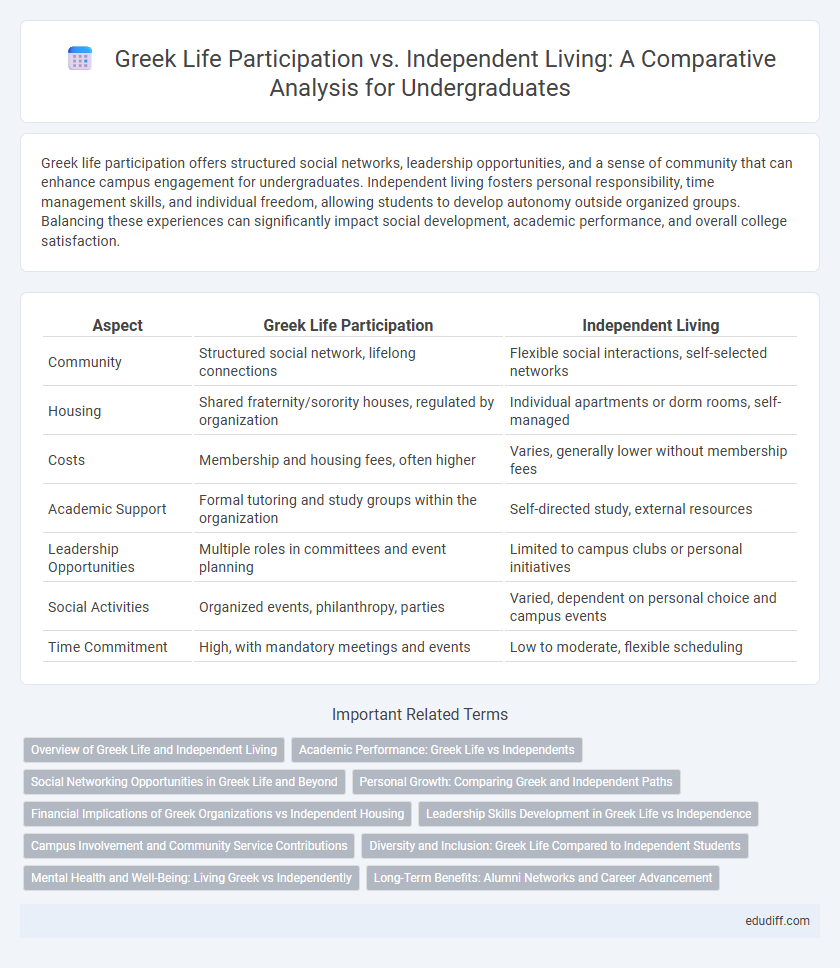Greek life participation offers structured social networks, leadership opportunities, and a sense of community that can enhance campus engagement for undergraduates. Independent living fosters personal responsibility, time management skills, and individual freedom, allowing students to develop autonomy outside organized groups. Balancing these experiences can significantly impact social development, academic performance, and overall college satisfaction.
Table of Comparison
| Aspect | Greek Life Participation | Independent Living |
|---|---|---|
| Community | Structured social network, lifelong connections | Flexible social interactions, self-selected networks |
| Housing | Shared fraternity/sorority houses, regulated by organization | Individual apartments or dorm rooms, self-managed |
| Costs | Membership and housing fees, often higher | Varies, generally lower without membership fees |
| Academic Support | Formal tutoring and study groups within the organization | Self-directed study, external resources |
| Leadership Opportunities | Multiple roles in committees and event planning | Limited to campus clubs or personal initiatives |
| Social Activities | Organized events, philanthropy, parties | Varied, dependent on personal choice and campus events |
| Time Commitment | High, with mandatory meetings and events | Low to moderate, flexible scheduling |
Overview of Greek Life and Independent Living
Greek Life participation offers structured social networks, leadership opportunities, and community service involvement for undergraduates, often fostering lifelong connections and academic support. Independent living allows students greater personal autonomy and flexible lifestyle choices, emphasizing self-management and privacy outside the campus housing system. Both options impact social integration, time management, and overall undergraduate experience distinctly.
Academic Performance: Greek Life vs Independents
Undergraduate students participating in Greek Life often demonstrate higher academic performance compared to independent living peers, with average GPAs ranging from 3.2 to 3.5 in many universities. Structured study hours, peer support, and access to academic resources within fraternities and sororities contribute to this enhanced achievement. Independent students may experience more variable academic outcomes due to less organized study environments and limited collaborative academic networks.
Social Networking Opportunities in Greek Life and Beyond
Greek Life participation significantly enhances social networking opportunities by providing structured events, leadership roles, and lifelong alumni connections that facilitate professional and personal growth. Independent living fosters diverse interactions but often lacks the built-in, organized social frameworks characteristic of fraternities and sororities. Networking in Greek Life extends beyond campus through national organizations, offering expanded career resources and mentorship not typically accessible through independent living arrangements.
Personal Growth: Comparing Greek and Independent Paths
Greek Life participation fosters leadership skills, community engagement, and networking opportunities that enhance personal growth through structured social and philanthropic activities. Independent living encourages self-reliance, time management, and decision-making abilities by navigating diverse social environments without organizational frameworks. Both paths offer unique developmental experiences critical to undergraduate personal growth trajectories.
Financial Implications of Greek Organizations vs Independent Housing
Greek life participation often involves mandatory dues, housing fees, and meal plans that can exceed $5,000 annually, impacting students' overall cost of attendance. Independent living offers a wider range of housing options with variable rent and utility costs, potentially allowing undergraduates to better manage their budgets. Financially, Greek organizations may provide inclusive amenities and social networking benefits that can offset some expenses but require careful consideration of long-term affordability.
Leadership Skills Development in Greek Life vs Independence
Greek Life participation significantly enhances leadership skills through structured roles, team management, and event planning, providing undergraduates with real-world experience in organizing and leading groups. Independent living fosters self-reliance and personal responsibility but often lacks the collaborative leadership opportunities inherent in Greek organizations. The structured environment of Greek Life offers more frequent and diverse leadership challenges compared to the solitary nature of independent living.
Campus Involvement and Community Service Contributions
Undergraduate students involved in Greek Life often demonstrate higher levels of campus involvement through leadership roles, event planning, and social networking, which fosters a strong sense of community and engagement. In contrast, independent living students may pursue diverse campus activities but typically show varied participation in structured community service projects. Research indicates that Greek Life members contribute significantly more hours to organized community service, enhancing local partnerships and philanthropic efforts.
Diversity and Inclusion: Greek Life Compared to Independent Students
Greek Life participation demonstrates structured diversity initiatives, offering multicultural Greek organizations that foster inclusivity among members from varied backgrounds. Independent students typically experience a more fluid, self-directed approach to diversity, engaging with campus-wide cultural events and affinity groups without affiliation constraints. Comparing both, Greek Life provides organized networks promoting belonging and support, whereas independent living encourages broader, individualized interactions across multiple diverse communities.
Mental Health and Well-Being: Living Greek vs Independently
Greek life participation enhances mental health and well-being by fostering strong social support networks and a sense of community among undergraduates, which can reduce feelings of isolation and stress. Independent living promotes autonomy and self-reliance, allowing students to develop personal coping strategies but may increase risks of loneliness without regular social interaction. Studies reveal that students engaged in Greek organizations report higher life satisfaction and lower anxiety levels compared to those living independently without structured social support.
Long-Term Benefits: Alumni Networks and Career Advancement
Greek life participation fosters extensive alumni networks that often lead to enhanced career opportunities and mentorship, significantly benefiting long-term professional growth. Independent living cultivates self-reliance and adaptability, skills valued by employers, but may lack the structured networking advantages Greek organizations offer. Studies indicate graduates involved in Greek life report higher rates of job placements and career advancement within five years of graduation compared to their independent living counterparts.
Greek Life Participation vs Independent Living Infographic

 edudiff.com
edudiff.com